Peter MALONE
Saturday, 18 September 2021 19:21
Terminal Velocity
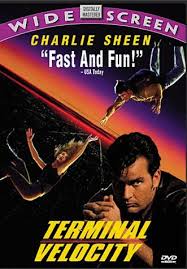
TERMINAL VELOCITY
US, 1994, 103 minutes, Colour.
Charlie Sheen, Nastassja Kinski, James Gandolfini, Christopher Mc Donald, Melvin Van Peebles.
Directed by Deran Sarafian.
Terminal Velocity is an entertaining, if farfetched, action adventure. It is a star vehicle for Charlie Sheen (who uses his gritted, jut-jaw style) and Nastassja Kinski as a very energetic heroine. James Gandolfini is a sinister, if smiling, villain.
The film is in the atmosphere of True Lies and Drop Zone - with some farfetched stunts which might make the makers of True Lies rather envious, and some free-fall and parachuting scenes which might make the makers of Drop Zone envious.
However, it may well have 'borrowed' some of its plot from Hitchcock's Vertigo.
The film is rather complicated with ex-KGB (KG used to be) agents on the make in America. The film has the courage of its convictions and is interesting, exciting and pacy. The director is Deran Sarafian, son of director Richard Sarafian.
1.Action show, stunts, effects? The US and the Russians in the '90s? The ex-KGB agents?
2.Arizona settings, Panavision, landscapes, the road, the sky sequences? Stunt work, special effects? Musical score and songs?
3.The title and audience expectations?
4.The conventions of the action thriller, audience expectations? The treatment as tongue-in-cheek? Serious but farfetched?
5.Charlie Sheen as Ditch: parachuting, falling through the city canyons, the literally cheeky invitation? His mistake at the celebration, the arrest? Out of jail, the parachuting company and the arguments? Penalties? His having to tidy up and shape up? Personality, responsibility and irresponsibility?
6.The opening sequences with the girl driving, the plane and its sudden landing? The mysterious phone calls? The murder of the girl, the killers? Their brutality, the mystery?
7.Chris and her wanting a lesson, her girlish manner, using Ditch? The men wanting to help her, Ditch's response? (The parallel with the plot of Vertigo for the mystery of the body falling from the plane?) Her manner in the plane, her disappearance, the free-fall, the discussion with the pilot? Ditch and his falling and trying to save her? The police? Ditch getting the wallet, following the leads, going to the apartment, encountering the killers? Following the clues and ultimately finding Chris and Lex? Their wondering why he took so long?
8.The district attorney, his insinuating manner, his inquiries, the interrogation of Ditch? The irony that he was the ex-KGB chief?
9.The explanation of the mystery, the break-up of the Soviet Union, the KGB and their contacts, wanting to make money? The gold shipment? Chris and her story of her family and the three-legged dog? Persuading Ditch? Their going to the plant, stopping the current, going to the room, getting the cylinder? The hang-gliding? The Russian killers arriving, the pursuit? His flying away? The vehicle chase? The cylinder, finding the location of the plane?
10.The gold, Ditch and Chris on the plane? The dead bodies, the gold? Their being stopped by the criminals? The escape down the plane, taking the vehicle, going to town? The clash and their breaking up? Chris and the photos - and her willingness to testify that she was not dead and save Ditch?
11.The sequence at the airport, Ditch and his finding the truth, commandeering the cars, the chase? The transfer of the gold? The KGB officers and their plan? The car, Chris in the boot of the car? Ditch and his discussion with Chuck, getting the plane, doing the stunt work? Getting into the flying plane after the stunts? The conflict with the killers, the rescue, the car free-falling, the KGB killer going to his death? Ditch and the key of the car, trying to rescue Chris? The safe landing - and the parallel with their encounter with the inventor, his helping them, being shot, their taking his speed machine and the ejection from it?
12.The KGB, the fight, being stabbed? The ultimate fight after his reappearance? Ditch pulling the parachute cord and his going into the oil machinery?
13.The humorous aftermath, Moscow, the ceremony and the speeches, the presentation of the medals, the family and the three-legged dog?
14.An enjoyable combination of adventure, suspension of disbelief, adrenalin-pumping action, humour and heroics?
Published in Movie Reviews
Published in
Movie Reviews
Tagged under
Saturday, 18 September 2021 19:21
Terminator 2: Judgement Day
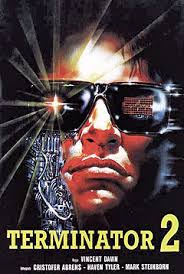
TERMINATOR 2: JUDGMENT DAY
US, 1991, 136 minutes, Colour.
Arnold Schwarzenegger, Linda Hamilton, Edward Furlong, Robert Patrick.
Directed by James Cameron.
Terminator 2: Judgment Day is the very successful sequel to 1984's The Terminator, written and directed by James Cameron (Piranha 2, Aliens, The Abyss, True Lies, Titanic). Cameron returns with a far bigger budget, Academy Award-winning special effects, expert stunts and a reworking of the original story.
The Terminator looked to the future, a devastated Los Angeles of the 21st century, the possibility of a saviour helping Los Angeles but evil Cyborgs trying to destroy him as they travelled back to the '80s. This time the focus is on the boy and his mother, a good Cyborg and an evil Cyborg struggling to destroy or to save him.
Once again Schwarzenegger is the Cyborg, this time on the side of good. Robert Patrick (Fire in the Sky) is expertly malevolent as the high-tech and fluidly reconstructing Cyborg. Once again Linda Hamilton is the mother and the film introduces Edward Furlong (Pet Sematery 2) as the future saviour.
The film takes a strong non-violence stand - after the initial violence of the opening, the arrival of the Cyborgs, the young boy, the future leader, instructs Schwarzenegger not to kill. The emphasis on the action rather than the violence is strong.
Very successful at the box office, the two Terminator films were excellent examples of the blend of science fiction and fantasy and action stunt films.
1.Impact of the sequel? Success, acclaim?
2.The work of James Cameron, emphasis on action, message: the nuclear destruction, the violent future, the developments and aberrations of science and technology, violence and non-violence?
3.Widescreen production, the images of future desolation, violent dreams, Los Angeles of the '90s? The stunt work, the special effects, especially with the evil Terminator? Weaponry? The musical score?
4.Arnold Schwarzenegger and his image, a more benign change in the '90s, heroic, the machine becoming humanised? The saviour contrasting with the evil Terminator? Apocalyptic images of the struggle between good and evil?
5.Sarah and her role, as a woman, strong, as the mother of the saviour, her love for her son, being excluded from his bonding with the Terminator, sacrificing herself for his destiny? The finale with mother and son grieving the destruction of their saviour?
6.The implicit religious subtext: Biblical themes of Armageddon, apocalyptic destruction? The larger than life saviour versus the incarnation of evil? Salvation of the world? Judgment?
7.How much did this film presuppose knowledge of the original: Los Angeles and its future, John Connor as saviour, the time-travelling, destructive terminators, protective Cyborgs, conflict between good and evil?
8.John Connor as the saviour, the adult John sending the protectors back to the past? John's relationship with his mother, Sarah and her hospitalisation, his being with his step-parents and deceiving them, playing with kids, stealing from the bank, video games? The change in his serious approach to his destiny? Meeting the Cyborg, the uncertainty, the rescue? The hostile machine and its pursuit, the chase? The hospital rescue of his mother? Going to the desert with the group and the cache of arms? The confrontation with Dyson and the destruction of the future? The final confrontation, the escape? The bonding with the Cyborg, language, questions about tears, his teaching the machine not to be violent? His grief at the end?
9.Sarah, strong woman, the experience of the past, in hospital, the loss of her son? Physical training, psychological interviews, the clashes with the doctor? Watching the videos of her interviews and her breakdown? The escape, the injections? The confrontation with the two Terminators? Her fears, John, the rescue? The voice-over and her commentary on the events in the future, her perspective? Her friends with the arms? Her anger with Dyson, destroying his office, the confrontation, inability to kill him? Her participation in the finale? With John and her grief at the end?
10.Schwarzenegger as machine, the Cyborg and its computer skills, working out issues, machine view of the world, calculations? The arrival, the bar, the bikies? Riding the bike, tracking down John, the phone call (and the change of voice)? The rescue of John and the chase, the hospital and Sarah? The pursuit by the evil Cyborg? His humanisation, the questions about tears, learning non-violence, phrases? The information about Dyson? The destruction in the laboratory, the final confrontation? The struggle between good and evil - and his having to be destroyed?
11.The evil Terminator, technological excellence, shrewd, shape-changing? Personification of evil, taking on the persona of the police, the threatening and ominous police? The killing of the step-parents and assuming their identity? Taking the shape of guards, drivers and pilots? Of Sarah? The pursuit, the chases, indestructible, reconstructing himself? Frozen, heated and coming to pieces, the final melting and the good Cyborg sacrificing himself?
12.The doctors, their treatment of Sarah, the escape from the hospital? The lewd guard and his behaviour with Sarah? His death?
13.Dyson, the scientist, technology, using the material from the future - and its being abused, destructive? The confrontation with Sarah, his family? His destroying his work and changing history? His heroic death?
14.The arms dealers, the hideout in the desert, the store of arms, friendship with Sarah?
15.The blend of science fiction and fantasy, a dramatic and violent fairy tale of the '90s, the issues of the future of the world, good and evil, violence? Violence and action?
Published in Movie Reviews
Published in
Movie Reviews
Tagged under
Saturday, 18 September 2021 19:21
Telephone, The
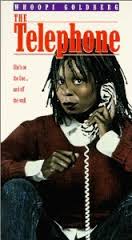
THE TELEPHONE
US, 1988, 82 minutes, Colour.
Whoopi Goldberg, Rip Torn, Amy Wright, Severn Darden, John Heard, Elliot Gould.
Directed by Rip Torn.
The Telephone was intended as a one-woman show for the talents of Whoopi Goldberg. However, the film is considered a disaster – and Goldberg is said to have wanted to sue to prevent the film from being released.
The screenplay is by songwriter Harry Nilsson and satirist Terry Southern (Dr Strangelove, The Magic Christian). The film is directed by actor Rip Torn.
Whoopi Goldberg appears as an out-of-work actress with psychological problems. She is at home, speaks a great deal on the telephone and has a succession of visitors played by Severn Darden, Amy Wright, Elliot Gould and John Heard.
Goldberg is a talented actress and tries her best to make her character come alive and to make the encounters and her desperation interesting. However, the film is rather hard going.
1.An interesting concept? The quality of the execution of the idea? The one-woman show? The value of this kind of performance on stage? On screen?
2.The writers and their contribution? Satire, psychological insight? - or not?
3.The room and its décor? The action taking place mainly within the room? The need for fluid camera movements? The range of close-ups and medium shots and editing? Musical score?
4.The strength of the cast and their cameo performances?
5.The credibility of the piece? The characters? Vashti? The interactions? Her desperation?
6.Whoopi Goldberg and her screen presence? Developing her character? Background, actress, out of work, the desperation? The visit with the actor and the interchange? The agent? The girl? The phone man? Their being foils for her performance?
7.The actor, agent, girl, phone man as characters in themselves? The stars and their performances? Interactions?
8.The character of Vashti: talkative, the range of her moods, the bird, the monologues, the character and expressions? Her range of voices: parody of Irish, English, the Queen? Guests? Supermarket and cigarettes? Priest and confession? Jive? A showcase for Whoopi Goldberg’s impersonations?
9.The overall impact of the film? Plot, characters, Goldberg?
Published in Movie Reviews
Published in
Movie Reviews
Tagged under
Saturday, 18 September 2021 19:21
Tapeheads
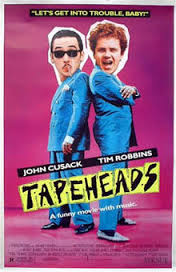
TAPEHEADS
US, 1988, 97 minutes, Colour.
John Cusack, Tim Robbins, Doug Mc Clure, Connie Stevens, Jessica Walter, Susan Tyrell.
Directed by Bill Fishman.
Tapeheads is the story of two young men with ambitions to make videos. It is a film made by and for young adults. It starts with a home movie about the growing up of the two young men, continues with their exploiting their job as security guards and the attempts to get themselves well known in the video market field.
The film highlights the nature of the media, especially home movies, home videos, exploitative videos and the music video. By 1988, when the film was made, music videos and video clips were taken for granted. It means that, in some ways, the film is behind the times with its presentation of video clips as if they were the latest thing, as well as the spoofs on the excesses. (The genuine articles have gone far beyond these spoofs in reality.)
The film also has a pot-shot at hypocritical American morals, especially with political figures and their cover-ups (and the role of video for blackmailing purposes as well as exposure purposes). John Cusack gives an uncharacteristic performance, full of push and liveliness. Tim Robbins also plays against type, being rather withdrawn and eccentric. (One of his songs, Repave America, was later used in his Bob Roberts.) The supporting cast includes Mary Crosby as a video agency femme fatale, Clu Gulager as the hypocritical politician (and Susan Tyrrell glimpsed briefly as his nemesis), Jessica Walter as the madam, Connie Stevens and Doug Mc Clure appearing briefly as Robbins’ parents.
The film has a frantic tone, highlights the ambitions of the young men, highlights the craziness of the media world. It is often frequently amusing and, when not, hurries on to the next plot development.
1.Entertaining film about film and video? Young adults film? The media, creativity, business?
2.The American city, studios, mansions and clubs, the media? The musical score and its range? Serious music, spoofed music?
3.The significance of video and its accessibility? Home movies? Surveillance movies? Spying movies? The importance of editing, special effects? Computer graphs? MTV? Video styles, visuals, vocals?
4.The opening home movie, the passing of the decades, Ivan and Josh as children, their friendship, always being together, sharing experiences? The contrast with their parents – Ivan’s father in show business and his wariness? Josh’s parents being conventional and their not approving what he was doing? The party, his father’s attack on him? Their work as security guards, fixing up the links and the connections and obscuring the party? The partying, their being discovered, sacked? Their decision to become the Video Aces? Josh creative, Ivan businesslike? The image, dress, the collage of Ivan’s visits and his failures, people avoiding him, kicking him out?
5.Ivan and his push, image, the jargon?
6.Josh, awkward, imaginative and shy?
7.Their making the videos after getting their premises, sharing them with Belinda? The interview with the man who wanted to do the trilogy `on spec’: the group, pouring the paint on them? The more sexy ad? The looking at the chicken franchise ad – and jazzing it up as a rap ad? Photographing the dying man and his will – propping him up and moving his jaw after his death?
8.Samantha, the invitation to do the video of the group, the mess? The news of the group’s dying at the Greek theatre? The movie of the funeral, editing it with their sound effects? The acclaim, the awards, fame and contracts?
9.Norman and his political ambitions, the video with the kids? His deviant behaviour in the mansion? Nicky and the tape, the confrontation, hiding the tape? The house, its owner – the exposure and her calling her lawyers? Samantha discovering the tape, the Hit Men and their infiltration, performance? Searching for the tape? The security guards, the shoot-out? The playing of the offending tape, it going out on satellite – and President Reagan’s reaction!?
10.Belinda, her art, her letting them share the premises, relationship with Josh, anger at Samantha? The irony that she was Norman’s daughter?
11.Contracts, their going after celebrities, the black singers in the club, their discussions, their reputations, hiring them? The Hit Men arriving and the black men running away? Their turning up for the performance, satellite concert? The audience and their response?
12.The glimpses of Josh’s parents, ordinary, conventional, disapproving? At home, seeing him in the tub with Belinda, at the premiere concert?
13.The young poking fun at the so-called respectable people, behaviour of the politician, using the security guards, foul-mouth in private, threats? Being literally exposed on television?
14.Verbal humour, visual humour, video humour? How realistic? How much spoof?
Published in Movie Reviews
Published in
Movie Reviews
Tagged under
Saturday, 18 September 2021 19:21
Tank
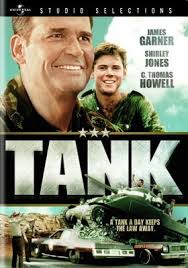
TANK
US, 1984, 113 minutes, Colour.
James Garner, C.Thomas Howell, G.D.Spradlin, Shirley Jones, James Cromwell.
Directed by Marvin Chomsky.
Tank is an odd mixture of the tongue-in-cheek and the serious. It is quite gung-ho – yet shows the brutality of southern whites and their antagonism towards people from the north. James Garner is a military sergeant who actually owns a Sherman tank. He clashes with people in a Georgia town, especially the dictatorial sheriff who runs his own prison and prison farm (an effective G.D. Spradlin). The film shows life in the American army. However, it also shows the generations – a touch of ordinary people where a younger son is still resentful of what he assumes is his father’s favouritism towards a dead older son. C. Thomas Howell is the son, Shirley Jones the mother.
In order to get back at the sergeant, the sheriff sets the son up as possessing marijuana for sale, imprisons him and sends him to the farm. The father decides to use his tank to blast the sheriff’s headquarters and then to rescue his son from the farm. With a young prostitute whom the sergeant had defended, the three take the tank through the back ways and along the highways of Georgia to the Tennessee border, becoming media folk heroes as they confront the sheriff.
The film is an odd mixture of humour and seriousness, of gung-ho American attitudes, of a critique of prejudice, of relationships in families.
1.Entertaining action adventure with a touch of comedy? Families?
2.The Georgia settings, the military camp, the small town, the back roads and the countryside? The special effects with the tank? The musical score?
3.The title, the focus on the tank, symbol of Zack? The use of the tank for the action?
4.The portrait of Zack: James Garner and his amiable style, relationship with his wife, with his son, the dead son? His pride in his tank? Arriving at camp, friends, his lecture to the soldiers, training them in the early morning? Home life? Going into town, the encounter with the prostitute, talking with her, the deputy slapping her, his hitting back? His going to the authorities? The revenge of the sheriff? The frame-up for his son? Going to deal with the sheriff, the forbidding of lawyers, the getting of the money, the selling of the boat? His wife’s hostile reactions? His son and the talk about favouritism? His son in prison? The talk about the farm, the threats of homosexual attack? His decision to take the tank, confronting the deputy, stripping him and tying him up in the town, the prostitute joining him, going to the prison farm, using the tank, the escape? Through the back roads, defending the man who had given them petrol? The TV coverage, communications? His injury, Bill driving the tank? The build-up to the confrontation, the final pulling of the tank by all the people, crossing the border and hoping for justice? Becoming a folk hero? The gung-ho attitudes – and putting them into practice for his son?
5.Bill, the younger son, the building of the tank, his studies? His suspicions of his father? Resentment about the episode with the prostitute? Talk with his father, the frame-up by the sheriff, beaten up, in jail, pleading with his father? At work on the farm, the escape, antagonism towards the prostitute, her explaining things, the reconciliation with his father, driving the tank? The family group at the end?
6.La Dona – Shirley Jones, the mother, love for her husband, the tension with the story about the prostitute, love for her son, getting the lawyer, the clash? Watching TV, besieging the governor and threatening him? The reconciliation?
7.The sheriff and his deputy, the deputy in the bar, control over the prostitutes, slapping the woman? His resentment against Zack? The sheriff, his manner, controlling the town, the initial interview with his deputy about the injury? Going to the military, despising the black officer? The threats? The counter-threat of making the town off-limits? Wanting revenge? Setting up Bill? The interview in the office, wanting the money? The stories about the farm? The rescue and his reaction? Deputising posses? Pressurising the governor but left to himself? Going to the military head and having the Constitution quoted against him? His vindictiveness, the pursuit, inciting people to riot? The effort backfiring? The confrontation at the border, the weaponry, the shooters? The tug-of-war with the tank? Feeling victory, yet falling in the mud? The humiliation of this kind of southern arrogance? The deputy, the yes-man to the sheriff – and his humiliation? The good ol’ boys in the posse and their antagonistic and racist attitudes?
8.The military, the general and his friendship with Zack, his not helping the sheriff, being there at the end? The black officer and his friendship? The confrontation with the sheriff and threatening him? The humorous episode with the cook confronting Zack – but grateful for the admiration for his food?
9.The prostitute, the come-on in the diner, Zack’s reaction, her being slapped, his defending her and her hostile reaction about losing her job? Helping him in the attack, in the tank, reconciling Bill with his father? La Dona and her acceptance of the prostitute?
10.The governor of Tennessee, ambiguous reactions, advisers, not wanting to make a decision? The confrontation with La Dona and her threatening him? His joining in the tug-of-war?
11.The popularity of the story, the appeal to the women, the bikies helping out, the tug-of-war and the pulling of the tank out of the mud?
12.A piece of Americana – heart on its sleeve? Themes of justice, persecution, revenge? Family values?
Published in Movie Reviews
Published in
Movie Reviews
Tagged under
Saturday, 18 September 2021 19:21
Talk Radio
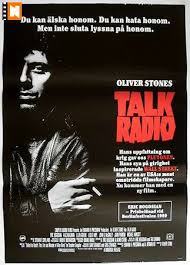
TALK RADIO
US, 1988, 110 minutes, Colour.
Eric Bogosian, Alec Baldwin, Ellen Greene, Leslie Hope, Michael Wincott.
Directed by Oliver Stone.
Talk Radio is a brilliant look at the personality of a radio guru, his own character, ability to cope with his image and his performance, his collapse, as well as the workings of radio, the motivations and responses of listeners.
The film is based on a one-man play by its star, Eric Bogosian. He gives a striking performance, fluent as well as intense. The director is Oliver Stone, who co-wrote the screenplay, opening out the one-act play as well as integrating material from other sources, especially a novel about the assassination of a radio talkback host.
Stone’s films are very strong, brilliantly directed, full of strong impact, fluid. This film is no exception, even though it is probably the least known of his films from the latter part of the ‘80s, which include Salvador, Platoon, Wall Street, Born on the Fourth of July, The Doors and JFK.
The film is set, significantly, in Dallas. The people who ring in offer the range of Americans and their prejudices, especially those of Texas. Right-Wing? rednecks ring up, lonely elderly women ring up, bewildered young women, stoned young men. There is a great deal of venom in the dialogue of the callers to the station. It is matched in the outbursts of the radio host. In the supporting cast are Alec Baldwin as the producer, John Pankow as a sponsor from New York, Lesley Hope as the host’s producer girlfriend, Ellen Greene as his ex-wife, John C. McGinley? as his panel technician. The film works particularly well as drama and as a sometimes scathing comment on the United States – and a great insight into radio.
1.A film about the media, the United States – scathing comment, aspects of human nature?
2.The writing and performance of Eric Bogosian? The collaboration with Oliver Stone, writing and direction? The strong cast?
3.The significance of setting the film in Dallas? Texas? The confining of most of the action to the studios – but fluidly presented? Angle shots, close-ups, through windows and panels? Life and movement within the station and the studio? The flashbacks and the outside sequences: the shop, the highway, the basketball stadium? The musical score? The range of music used, especially the inserts by the talkback host?
4.The significance of words, the articulate screenplay? Radio as a word medium, the personal impact of host to individual listener? The contents of the calls to the radio station, the loneliness, ignorance, foolishness, hoaxes? The significance of the bigotry? The treatment by the host of the guests, fluent, abusive?
5.The role of radio, the Dallas experience, the range of audience, characters ringing in, the men, the women? Thoughtless, prejudice? Inviting guests in – and the stoned young man? The dependence of the listeners, filling a space in their life, not turning off despite their hostility?
6.Eric Bogosian’s screen presence and style, appearance, fluency in talk? The initial impact of the opening of the film and seeing him perform, his reactions to Dan and to the sponsor, to Stu and to Laura? The contact with Ellen, the flashbacks? The young Barry, Jewish background, working in the rag trade, selling suits? His persuasive patter, the judge? His hair, clothes? His relationship with Ellen? Too busy to go out for meals? The radio host coming to the shop, the flip invitation to the studio? Barry and his responses, taking over, abusive, sending up the audience and the caller? The anger of the host? The offer of the audition, his clever patter, his success – and Ellen ringing up and communicating with him as Cheryl-Anne?
7.The night of the talkback, the pressure, Dan and his presence, smooth, taking responsibility for the show? The plan for the Chicago sponsor? His presence, watching, supporting, his comments? Barry and his reaction to the sponsor, hostile – yet announcing on air that he would go national? His later abuse of the sponsor for delaying the going nationwide? Stu, the interactions, the notices, the names on the monitor? Stu and his anger with Barry? Putting on difficult cases – especially the rapist? Laura and her work, support? The personal relationship? The difficulty in sorting out her role as producer and as girlfriend – and not as wife?
8.The importance of the content of the callers talking: the range of US concerns? Racism, Barry as a Jew, the black callers, Barry and his reaction about hostility between black and white? Blacks kow-towing to Jews? The use of homosexuals as a focus of abuse? Government and its pandering to the population and to elections? The sadistic parent ringing in about beating his children? The old man and the exchange of proverbs and cliches? The stoned young man and his party? The lonely girl and her long hair? The women ringing up just to talk, saying that they loved Barry, not knowing why they listened? The rapist and his anguish and Barry trying to hold him on air? The neo-Nazi prejudice? The sending of Nazi flags – and the dead rat in the parcel? The death threats?
9.The fluency of words, Barry’s abusing his audience and their taking it? Why? His long speech in the latter part of the film about Chicago, going nationwide, his audience? His admitting the thrill of the program, the support, his ego, ratings? His inviting the stoned young man into the studio despite Dan’s criticisms? The interviews and his obvious spurning of the young man?
10.The response to the show: Barry going out, autographs, the basketball match, his welcome – and then his being booed? The girl taunting him and throwing the drink over him?
11.Laura, listening to Barry as a girl, admiring him, his producer, girlfriend, her confusion? At home with him? In on the deals? Barry’s abuse of her? Her encounters with Ellen?
12.Ellen, the phone call, ringing him from the airport, their talk in the car-ride, the bond between them? Her new life, health, recovering from Barry? The flashbacks, in the shop, her love for him, support, the meals? The audition and her being Cheryl-Anne? and supporting him? Her absence, coming home to the sex party, her walking out, sense of betrayal? Her coming to support Barry and the nationwide show? In the studio, supporting him, compassion? Seeing him collapse, ringing up as Cheryl-Anne? Her declaration of love? His listening, going into his radio persona and abusing her? Her hurt and her leaving?
13.Barry, his background, Jewish consciousness? Working in the shop? Enthusiasm for radio, his talent for it? The years and the program, public celebrity, the man you love to love – or hate? His confusion, his personal life, antagonism towards people, exploiting them? Stu and his anger with him? Dan and his exasperation? The doubts of the sponsor? His long speech about himself – the possibility of self-revelation and understanding? People reacting as if it was just a great show?
14.The sponsor, the business world, using radio, interference? The interest of the sponsor – and his sinister presence?
15.Stu, old friendship with Barry, at the sex party, sympathy with Ellen? Antagonism towards Barry, yet friendship? Arguments about vetting the callers? Letting the rapist go on?
16.Dan, business, the smooth-talking producer, concerned about deals?
17.Barry and the end of the evening, going downstairs, out into the plaza, the fan, the confrontation, the violent abuse, the death threats and the shooting?
18.The range of radio comments after Barry’s death, tributes, assessments, criticisms? The role of the radio host, celebrity? People imposing their own image on such celebrities? And American society and the violent killing of celebrities?
19.A picture of the media in the ‘80s, radio, sponsorship, fans? A significant piece of Americana?
Published in Movie Reviews
Published in
Movie Reviews
Tagged under
Saturday, 18 September 2021 19:21
Taipan
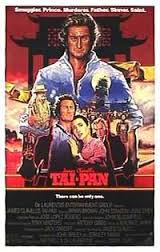
TAIPAN
US, 1986, 127 minutes, Colour.
Bryan Brown, Joan Chen, John Stanton, Kyra Sedgwick, Janine Turner.
Directed by Daryl Duke.
Taipan is the film version of James Clavell’s novel about the origins of Hong Kong. Clavell (who directed such films as Walk Like a Dragon, To Sir With Love, The Last Valley) is best known as a novelist of such huge tomes as Shogun and Noble House. Shogun was a successful television mini-series with Richard Chamberlain.
However, Taipan was not a successful film. While it is spectacular and is something of a pageant, blame was laid on the screenplay (written by Oscar-winning writer John Briley (Gandhi) and Stanley Mann). It was directed by Daryl Duke, director of such films as Griffin and Phoenix and Florence Nightingale, as well as The Thorn Birds.
Bryan Brown (who appeared in The Thorn Birds) gets top billing with Australian John Stanton coming next. The supporting cast is not particularly well known, a mixture of American, British and Chinese actors.
The film is very colourful and attractive to look at (photography by director Jack Cardiff) with music by Maurice Jarre. However, it is probably the equivalent of a Reader’s Digest version of Clavell’s story.
1.Enjoyable film? Spectacle and pageant? History of Hong Kong?
2.The work of James Clavell, the 19th century history, Asia? The scope of the story?
3.Wide screen photography, Chinese locations? Re-creation of period, costumes and décor? The pageantry? Special effects, the hurricane? The musical score?
4.The background of 19th century trade, China and its suspicions, British Empire pirates, the role of the British, the smuggling of opium and other goods, the reaction of the Chinese royalty, their anger, the burning of the opium?
5.The British Taipan and the head trader in the region? Struhan and his authority? The clash with Brock and his ambitions? Their ships, cargo, followers? The establishing of Hong Kong as a trading centre? Confrontations?
6.Struhan’s character and presence, his family, Scottish background? His bond with the China Lady? Collum and his love for his son? The decision to found Hong Kong? The land, the clashes with Brock, personality, trading? Struhan going into debt, the repayment with the silver? Building Hong Kong, the ambitions for Noble House? The place of Hong Kong society, his influence? The relationship with Mary, the young officer and her engagement? Collum and the building of the church? Collum’s plan to marry, the clash with Brock’s son? Killing him in the fair fight? Brock and his anger, the plan for the marriage, the duel? The ball and the China Lady not being able to go, upset, her pregnancy, the loss of the child? Struhan building up Hong Kong, the hurricane, the destruction of the buildings, his death with the China Lady?
7.Brock and his severity, ambition, his wife, pride in his son, ruthlessness, money and debt, using his wits? Tricked by Collum? His place in the new society? His ships? His son, the marriage of his daughter? Pleading the cause with Struhan? His son’s death, his anger, the duel? Surviving – and offering to bury the Taipan? The confrontation by Collum?
8.Collum, Scots background, devotion to his mother, scandal at the China Lady? Religion, ingenious about the clash between his father and Brock and the sale of the land? Friendship with the captain? Friendship with Brock’s son? Attracted to the daughter, support of his friends, going to the brothel, the plan for him to be infected, his leaving the woman? Marrying Brock’s daughter on ship? Surviving and becoming the Taipan, standing up to Brock?
9.The contrast between the two sons, Brock’s son as vicious in his friendship, his death?
10.The women of the East: the wives and society, the ladies of society, Mary as the prostitute making good, the Chinese mistress and her being held out of sight – yet beloved by the Taipan, their time together, love, discipline and cruelty, pregnancy and death?
11.The presentation of the colonials, the merchants, the army, sailors – their role, building up Hong Kong society?
12.The establishing of the colony, its style and manners, relationship with China? The final credits and the presentation of modern Hong Kong and the achievement?
13.Popular epic and treatment of 19th century history?
Published in Movie Reviews
Published in
Movie Reviews
Tagged under
Saturday, 18 September 2021 19:21
Tailor of Panama, The
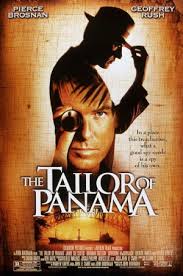
THE TAILOR OF PANAMA
UK/Ireland, 2001, 109 minutes, Colour.
Pierce Brosnan, Geoffrey Rush, Jamie Lee Curtis, Brendan Gleeson, Catherine Mc Cormack.
Directed by John Boorman.
The name of John Le Carre has become almost synonymous with British espionage tales. For forty years he has written fictionalised accounts of the Iron Curtain cold war intrigues, spying in the Middle East and, now, the more recent focus of intelligence gathering, Latin America. Not that spying in this region of the world is new. The Tailor of Panama has overtones of Graham Greene novels, and more than a passing resemblance to Our Man in Havana. While spies were not necessarily gentlemanly in those days, there seemed to be some underlying presumptions of fair play. Nowadays some of them seem like narcissistic buccaneers. Or, at least, that is what Pierce Brosnan’s callow MI6, Andrew Osnard, turns out to be.
Osnard has had to be transferred from Spain in a hurry. His last chance is Panama. Using every suave trick of the trade as well as a menacingly polite manner in blackmail, he recruits Harry Pendel, the gentleman’s gentleman tailor to the politicians and the wealthy of Panama. While Brosnan draws on his James Bond style to portray, very effectively, a seductive rotter, Geoffrey Rush gives another persuasive performance as Cockney Harry trying to be the gentleman. Rush seems to take on each character so completely that it is difficult to recognise him from one role to another. Jamie Lee Curtis is Harry’s politically idealistic wife.
In past spy films, there were elements of farce in the obtuseness of what the MI6 head here refers to as ‘the planners and plodders’. But, generally, those films were grim affairs. In Panama, there is more farce than seriousness. In the aftermath of the Noriega regime and its corruption, there is still corruption. But there is democracy (and the film’s exteriors were all shot in Panama), electronic intelligence data-gathering and surveillance. And, according to Le Carre, the big brass in London or the Pentagon, still have strong yearnings for conspiracy theories – and hanker after the glory days of the cold war victories.
But, Harry Pendel has constructed a fiction for his life as a Saville Row tailor in Panama. He tells a good yarn. When pressurised by Andy Osnard to become a spy, he takes the fiction way out. He makes it all up. Which actually suits Osnard who wants to use a conspiracy to milk the authorities of millions of dollars in supporting an alleged silent opposition. What could go wrong? Well, a United States invasion of Panama, for instance.
This film shows us what a messy world we live in. While communications and media can stop the stealthy invasions of the past, they can still be a too rapid means of disseminating mis-information that can lead to wars and disasters. Thirteen Days recently reminded us of the need for some kind of integrity at the top of government. The Tailor of Panama shows us that despots can get into power if they are rich enough, that ordinary people can be destroyed by torture and by fear and that we are sometimes only an ignorant fanatic’s
decision away from disaster.
1. John Le Carre and his reputation? His study of espionage from the ‘60s to the turn of the century? Changing patterns: the Cold War, the Middle East, Central America?
2. The role of the UK? MI6? The James Bond image? The Le Carre and Graham Greene image? Politics, international collaboration, for example the CIA, interference in the running of other countries? Secrecy? Ambitions? Successes and errors?
3. The Panamanian settings, the city, the countryside, the canal? Authentic atmosphere? The musical score? The strength of the stars and their variety of screen images? Pierce Brosnan playing opposite James Bond style?
4. The title and its focus? The image of the tailor, Saville Row, the tailor to gentlemen? The tailor as servant, obsequious, flattering? The tailor as skilful, knowing materials, sizes and shapes? His capacity for understanding people? Confidant – an image of confessional? Gossip? The target for MI6 and espionage?
5. Andy and his reputation, Spain, recalled? Unscrupulous? Sexual predator? His being sent to Panama and his commission? The background of the Panama Canal, American administration, Panamanian ownership?
6. The background of the Noriega period? Marta and her torture? Miguel and his experience? Harry and his memories of the period? The American action in Panama and the taking of Noriega? The subsequent democracy? American relationships? British? The issue of Panama selling the canal or interests in the canal?
7. Harry as the tailor: Uncle Benny and his appearances and giving him advice? Harry’s reputation, manner of dealing with his clients? His office, his waiting-room, his clients not paying, his need for credit and reputation? The story of his imprisonment, the fraud and the burning down of the factory, learning tailoring skills in prison, Uncle Benny getting him to Panama and a new life? His learning conman skills? His marriage to Louisa, seeing her as a princess, not telling her the truth, the children, home life, taking them to school? Birthdays, picnics, getting the breakfast? The success of his new life?
8. Andy and his recruiting him, fitting for the suit, Andy telling him his life story? The issue of Ramon and the ownership of the farm (and the glimpses of its lack of success, water)? The promise of money? His using Louisa’s inheritance? The truth about Ramon and the ownership?
9. Harry and his taking Andy around, the hotel and the explanation of the politicians, the advisers, the wealthy families, the corruption? His introducing him to Miguel and telling him the story? Andy and his reaction to Marta? Interest in Louisa? The information about the canal? Harry and his fitting the President? Harry’s capacity for telling stories? Making up the story about possible people buying the canal? Using the information from the pornographic video to give him ideas for nationalities? The different rendezvous for meeting Andy? The seedy background, Louisa’s suspicions? The photographing of Louisa’s documents? The building up of the story of the silent opposition and Miguel?
10. Andy, his being a buccaneer, unscrupulous? His decision to take on Harry, blackmailing him? The various meeting places? Capitalising on Harry’s stories, trying to make them plausible? His going to the embassy, contact with the ambassador, with Francesca – the dinner, the proposition, the sexual relationship? His role in giving information, MI6 and believing the information? Harry being taped, the information going to UK, to the United States?
11. The United States and the Pentagon, their believing the information about the silent opposition? The officer from the period of Noriega and his gung-ho attitudes? The money available, the decisions, the invasion of Panama (mirroring 1989)?
12. Louisa and her realisation of the truth, the picnic and her learning Harry’s personality, going to him and confronting him? Giving information to the Panamanians?
13. Marta and Miguel having to get away, the society spies, the unearthing of Harry’s double-dealings? His going to Miguel and Miguel’s suicide? Pursuing Andy? Andy and his blackmailing the ambassador and getting away with the money? The airport?
14. Harry going home, the invasion called off, the reconciliation with Louisa? Andy and his giving the money to the ambassador, taking the rest – on the plane?
15. A picture of espionage in the ‘90s? American gung-ho attitudes? British ambitions? The cynical and unscrupulous personalities? Using pawns? The dangers of war from this kind of espionage activity?
Published in Movie Reviews
Published in
Movie Reviews
Tagged under
Saturday, 18 September 2021 19:21
Little Gloria, Happy at Last
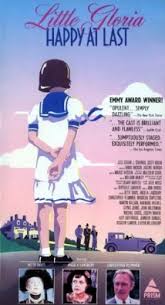
LITTLE GLORIA - HAPPY AT LAST
US, 1982, 179 minutes, Colour.
Bette Davis, Angela Lansbury, Lucy Guttredge, Martin Balsam, Christopher Plummer, Glynnis Johns, Michael Gross, John Hillerman, Barnard Hughes, Maureen Stapleton.
Directed by Waris Hussein.
Little Gloria - Happy at Last is an interesting telemovie, lavishly made. It focuses on affluent American families in the '20s and '30s, especially the Vanderbilts. The film has given great attention to the style of the period in decor and costumes.
The film was directed by Waris Hussein (director of films in England like A Touch of Love, Melody, The Six Wives of Henry VIII, and telemovies in America - Callie and Son). The film has an impressive case led by Bette Davis as the matriarch, Alice Vanderbilt. Christopher Plummer has an effective role in the early part of the film as ailing playboy Reggie Vanderbilt. Angela Lansbury sustains the film as the competent Gertrude Vanderbilt. Lucy Guttridge is very good in the central role of Gloria Morgan. There are excellent vignettes from such actors as John Hillerman as a caustic gossip columnist and Glynnis Johns as Gloria's eccentric mother.,
The film is based on a best-seller by Barbara Goldmsith.
1. An entertaining and interesting telemovie? For American audiences? Non-Americans? Interest in the plot, characters, situations? The visual flair of the film?
2. Production values: re-creation of period in the United States, Europe? The lifestyles of the rich? The strong attention to period detail? Contemporary musical score? The length of the film and the sustaining of interest?
3. Americana: the facts about American families, their behaviour, standards? Their dreams and ambitions? Consequences? Success and failure? The differing generations? Power, manipulation, selfishness and their consequences?
4. The title and its irony? The family background, G1drials birth, upbringing, custody case? Her experiences in later life and coping with the controversies? The failure of reconciliation with her mother? The irony of the title: happy at last..., if ever?
5. The portrait of the Vanderbilts: their status as an East Coast family, their name, pride? wealth, business interests, political and social influence? Mansions? Typical? 'WASPS'? Their narrow attitudes e.g. towards Catholics, Jews? The matriarch and her dignity, severity, love for her children, understanding them, willingness to relent? Her love for Gloria? Reggie as the affable middle-aged man, divorced, charm, ill-health, gambler? Gertrude and her competence, kindness, pride, wanting to do the right thing? Bette Davis' style as Alice; age, dress, her not favouring Gloria, meeting her, change of heart, later helping her?~ Her grief at Reggie's death? His charm and her understanding it? Her confrontation with Gertrude about her life? The impact of her death? Reggie as affable, charming, serious? Falling in love with Gloria? The hope for the child, the will? Gloria's plans for travel and Reggie's death?
6. Gertrude and her style: sophisticated, wealthy, a sculptor? Her husband, advisers, affairs and her private discretion? Discussions with her mother? Her belief in the family, supporting it? Interest in little Gloria, concern about her upbringing, minding her, decisions about her education? Discussions with the trustees, the judge? information from the nurse? Investigations and court case? Her motivation?
7. Gloria as young and ingenuous? Her experience? Her travelling upbringing, her sisters and their affluent marriages and divorces, her mother and her notions of grandness, living at the Waldorf, Spanish ancestry and nobility? Her pushy mother? Separated from the diplomat father? The Catholic tradition in name? Gloria falling in love, meeting the Vanderbilts. lyrical interludes with Reggie, the marriage, plans, the will and his debts, the birth of their daughter? Her coping with his death? Under-age, inability to cope? The support of her sisters? Her mother and the growing antagonism?
8. Gloria and her daughter: legal arrangements. the judge? Doing her best but inadequately? Her love of travel, wealth, Europe? Loving her daughter - but at a distance? Thoughtless. affluent lifestyle, scandals? Servants' animosity? The parallel with her sisters, the influence of her mother? Distance from the Vanderbilts and feeling inferior to them? Her ousting her mother from her home? Employing the nurse and Gloria’s affection for the nurse? A build-up to confrontation?
9. Little Gloria as a pampered and favoured baby, heiress, news headlines, pampered? Always seen as special? The Vanderbilts, the travel to Europe? England and her dislike of tastes? Her schooling, writing letters home, an eccentric little girl animosity towards her mother? The bond with her nurse? The Catholic baptism, saying her prayers (and later not being able to remember then, well)? Her return to America and the Lindbergh kidnap headlines, her phobia about kidnapping, nightmares? The visits to the various doctors, the health regimes? Her attitudes being poisoned by the nurse? Fearing her mother? The nurse and little Gloria running away?
10. Maureen Stapleton's portrait of the nurse: employed, Irish, narrow, strong Catholic? Sleeping in the same room as little Gloria for years? Bitter, possessive, despising the mother? Poisoning the daughter's mind? Keeping in touch with Laura, the venomous letters? Influence with Gertrude? Taking little Gloria away? Her hostile reaction to being sacked? Her viciousness in the court? What harm had she done Gloria?
11. Laura and her eccentric manner, behaviour, way that she brought up her children, lack of support from Gloria, keeping in touch with the nurse, turning on her daughter, exposing her to scandalous accusations, friendship with Gertrude?
12. The custody trial: the lawyer, wanting the truth from Gloria, behaviour in the court, legal aspects, scandal and evidence, servants' testimony? The impression that he made? His lack of success in the case?
13. Maury as a chorus commenting on Gloria's behaviour? The bitchy gossip columnist - being at society functions, his manner of speaking, wit, incisiveness? His dictating his articles? The changing opinions via his chorus comments?
14. The judge, the pressure of the case, his cantankerous behaviour, sympathies, growing erratic comments, the history of madness?
15. The decision of the court, the effect on little Gloria? The effect on her mother? On Gertrude, on the nurse? Happy at last - and the final information given?
16. The audience interest in the doings of families with wealth and in high places? The glamorising of universal problems? Exploration of behaviour, manipulation and motives?
Published in Movie Reviews
Published in
Movie Reviews
Tagged under
Saturday, 18 September 2021 19:21
41 Year Old Virgin who knocked up Sarah Marshall and felt superbad about it

THE 41-YEAR-OLD VIRGIN WHO KNOCKED UP SARAH MARSHALL AND FELT SUPERBAD ABOUT IT
US, 2010, 82 minutes, Colour.
Directed by Craig Moss.
This film offers a satire, spoof of several of Judd Apatow films. While the title is amusing, the film immediately launches into bad taste and disgusting jokes. One of the difficulties with this kind of joke is the parody of the original (and the original being better than the parody) and not having a context for some of the bodily function jokes as well as the sex jokes.
Audiences who are interested in spoofs will notice a lot of parallels with the original films – the waxing sequence from The 40 Year Old Virgin, the adventures of the two young fellows in Superbad.
The film also has a number of amusing parallels with the original characters, especially in the appearances of the actors. Steven Sims is very much a parallel to Jonah Hill. Austin Michael Scott does a Michael Cera. There is also a parallel with Seth Rogan.
The film was co-written by Brad Kaaya and director Craig Moss. It has a certain exuberance about it – but relies very much on the bad taste jokes and the disgusting element.
The film serves as a curiosity item of how parodies saw the comedies of Judd Apatow of the first decade of the 21st century.
Published in Movie Reviews
Published in
Movie Reviews
Tagged under